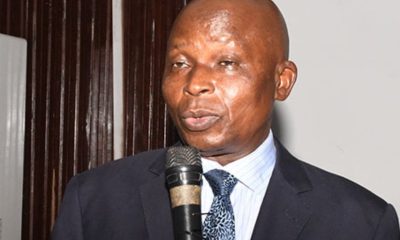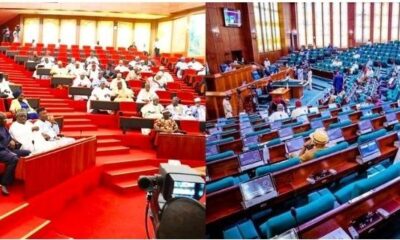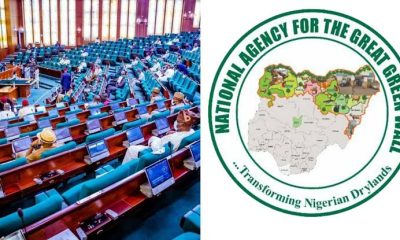News
Reps begin probe into $2.5bn annual loss to gas flaring

The Speaker of the House of Representatives, Rep. Tajudeen Abbas has inaugurated an Ad hoc Committee to investigate alleged 9.05 billion dollar-revenue loss from gas flaring in the last one decade in Nigeria.
Abbas, at the inauguration of the House ad hoc committee on Gas Flaring on Monday, charged the committee to get root causes of gas flaring and make recommendations to end the menace.
He said that the probe is an acknowledgement of the urgent need to understand and mitigate the environmental, social, and economic impacts of this practice.
“The task before this ad hoc vommittee is a very critical one that lies at the heart of the health of our people and economic well-being of our nation.
“You have been charged with the responsibility of investigating, perhaps, one of the most harmful practices in the oil and gas industry in Nigeria.
“Gas flaring and venting has been a significant environmental, economic, health and social concern in our country for many years.
“The flared gas represents lost revenue that could have been generated through its sale or utilization. Official records indicate that we lose about 2.5 billion dollars annually to gas flaring,” he said.
He said that as a major contributor to climate change and environmental degradation, gas flaring has direct and indirect impacts on soil, water, and wildlife.
According to him, gas flaring represents a tremendous waste of valuable resources; it is a precious energy source that could be utilised for various purposes, such as electricity generation, heating, or industrial processes.
Earlier, the Chairman of the committee, Rep. Babba Munir (APC-Kaduna state) said that the members were representing the interest of all Nigerians.
He said that the issue of gas flaring had lingered for decades despite several undertakings by oil companies to stop it.
“We are here to give everyone a fair hearing, to know where the loopholes are, where we need to twike our laws to ensure we get optimal result.
“We do not have to revisit how important it is to our revenue drive needed for infrastructure, security, education and health.
“It is a win win situation for even the oil companies, because if revenues are generated, it was spent on securing our nation, on infrastructure that will better their operations.
“We are insisting and putting our feet down that all agencies of government and oil companies.
“Once you are invited, we expect you to come with your full submissions and with the highest representation of your organisation,” he said.
The committee invited Total/Mobil V Domestic wing, Total/Oando JV, Total Energies, African Petroleum (AP) Pic. now Ardova PLC to appear before or on Tuesday at 10 a.m.
Others are Azman Oil and Gas Limited, Matrix Oil And Gas Shata Ltd, Nigerian Electricity Regulatory Commission (NERC), National Council on Climate Change (NCCC) and Nigerian Petroleum Development Company (NPDC)
Also to appear are Yinka Folawiyo Petroleum Company (Aje Oil Field-Offshore), Sterling Oil Exploration & Energy (SEEPCO), Belemaoil Producing Limited.
Walter Smith Petroman Oil Limited, Green Energy International Limited, Millenium Of and Gas Company Limited, Folawiyo Energy Eroton Exploration and Production Nigeria Limited and Niger Delta Petroleum Resources LTD.
NAN reports that the Nigerian Oil Spill Detection and Response Agency (NOSDRA) said Nigeria lost N891bn to gas flaring in 18 months.
Aaccording to data from NOSDRA on Aug. 8, 2022 Nigeria lost a total of N707bn in 2021 and N184bn in the first half of 2022, totaling N891bn.
According to the NOSDRA report, oil and gas companies operating in the country flared a total of 126 billion standard cubic feet, SCF, of gas in the first half of 2022, leading to a loss of $441.2 million, (about N183.54 bn) in the six-month period.
On the other hand, the agency said, in 2021, about 23,862.271 barrels of oil (3,770,238.864 litres/119 tanker trucks) were spilled.
Giving a breakdown of the gas flared in the country in the first six months of 2022, the agency disclosed that while companies operating in the offshore oilfields flared 62.2 billion SCF of gas, companies operating onshore flared 63.9 billion SCF of gas, valued at $223.6 million.
In 2021, there were around 382 publicly available oil spill records. Out of the 382 occurrences, a total of 33 of these oil spill sites were not visited by a joint investigation team, and 122 of these had no estimated quantity of oil spilled provided by the companies involved.
Two major oil spills were recorded in 2021, with over 250 barrels spilled into inland waters, or over 2,500 barrels spilled on land, swamp, shoreline and open sea, the report said.
A total of seven medium oil spills incidents were recorded in 2021, with 25-250 barrels spilled into inland waters, or 250-2,500 barrels spilled on land, swamp, shoreline and open sea.
In terms of minor oil spills, about 239 cases were recorded as up to 25 barrels spilled into inland waters, or 250 barrels on land, swamp, shoreline and open sea.
News
Woman killed while crossing road in Anambra

The Federal Road Safety Corps (FRSC), Anambra State Sector Command, has confirmed the death of a woman in an accident at Okpoko Market on the Asaba-Onitsha Road.
The Sector Commander, Mr Adeoye Irelewuyi, who confirmed the accident to journalists in Awka on Thursday, said that the woman was hit while she was crossing the road.
He said that the accident, which occurred on Wednesday, involved a commercial tow truck with registration number XA550BMA.
“Eyewitness report reaching us indicates that the truck was towing a vehicle in an uncontrollable speed along the axis.
“The vehicle that was being towed got detached from the tow truck.
“It hit and killed a female adult, who was said to be crossing the road, while the tow truck continued its movement.
“FRSC rescue team came to the scene and took the woman to Toronto Hospital, Onitsha, where she was confirmed dead and her body deposited at the hospital’s mortuary,” he said.
While sympathising with the family of the dead, the sector commander urged motorists, especially tow truck drivers, to exercise a high level of professionalism.
He also urged the drivers to always use standard equipment and avoid speeding.
News
LASG’s maize palliative impactful, says poultry association chair

The Chairman, Poultry Association of Nigeria (PAN), Lagos State Chapter, Mr Mojeed Iyiola, said the state government’s maize palliative to members of the association made a positive impact on the sector.
Iyiola said this in an interview with the News Agency of Nigeria (NAN) on Thursday in Lagos.
“We received about 150,000 tons of maize in February from the Lagos State government as palliative to cushion the effect of high feed prices.
“The major benefit of the palliative is that it actually cushioned the cost of production for most poultry farmers in the state.
“The palliative was beneficial as it made the cost of some poultry produce, especially eggs to drop,” Iyiola said.
He noted that prior to the palliative, a crate of egg was sold between N3,500 and N3,700 at the farm gate, but after the palliative, it now sells between N3,200 and N3,400.
According to the PAN chair, retailers and middlemen who sell from N3,800 to N4,200 do that for their personal gain.
“We have urged our members to sell their eggs at reasonable prices following the receipt of the palliative from the government.
“We appreciate the Lagos State government for the palliative but we also urge the federal government to do likewise, to further reduce the cost of production in the sector.
“This will consequently lead to drop in the prices of all poultry produce across board,” he said.
He said the palliative was shared among financial members of the association at no extra cost.
“As an association we shared the grains equally across PAN’s eight zones in the state equally. We also mandated each zone not the sell even a grain of the maize.
“We, however, considered new poultry farmers who wanted to the join the association as beneficiaries of the palliative,” said Iyiola.
He noted that through the palliative, more poultry farmers were recruited into the association.
“The maize was shared only to poultry farmers and not feed millers, it is the major component of poultry feed formulation,” he said.
-

 Business4 days ago
Business4 days agoSeplat Energy celebrates a decade of Dual Listing with Bell Ringing Ceremony at Nigerian Stock Exchange
-

 News4 days ago
News4 days agoBDCs now buying dollar at ₦980 — ABCON President
-

 Metro4 days ago
Metro4 days agoOsun Poly Student, Olanrewaju Olatona killed by hit-and-run one-way driver
-

 Headline4 days ago
Headline4 days agoFagbemi warns against obstructing EFCC from performing its lawful duty
-

 News4 days ago
News4 days agoLASG’s maize palliative impactful, says poultry association chair
-

 News4 days ago
News4 days agoWoman killed while crossing road in Anambra










